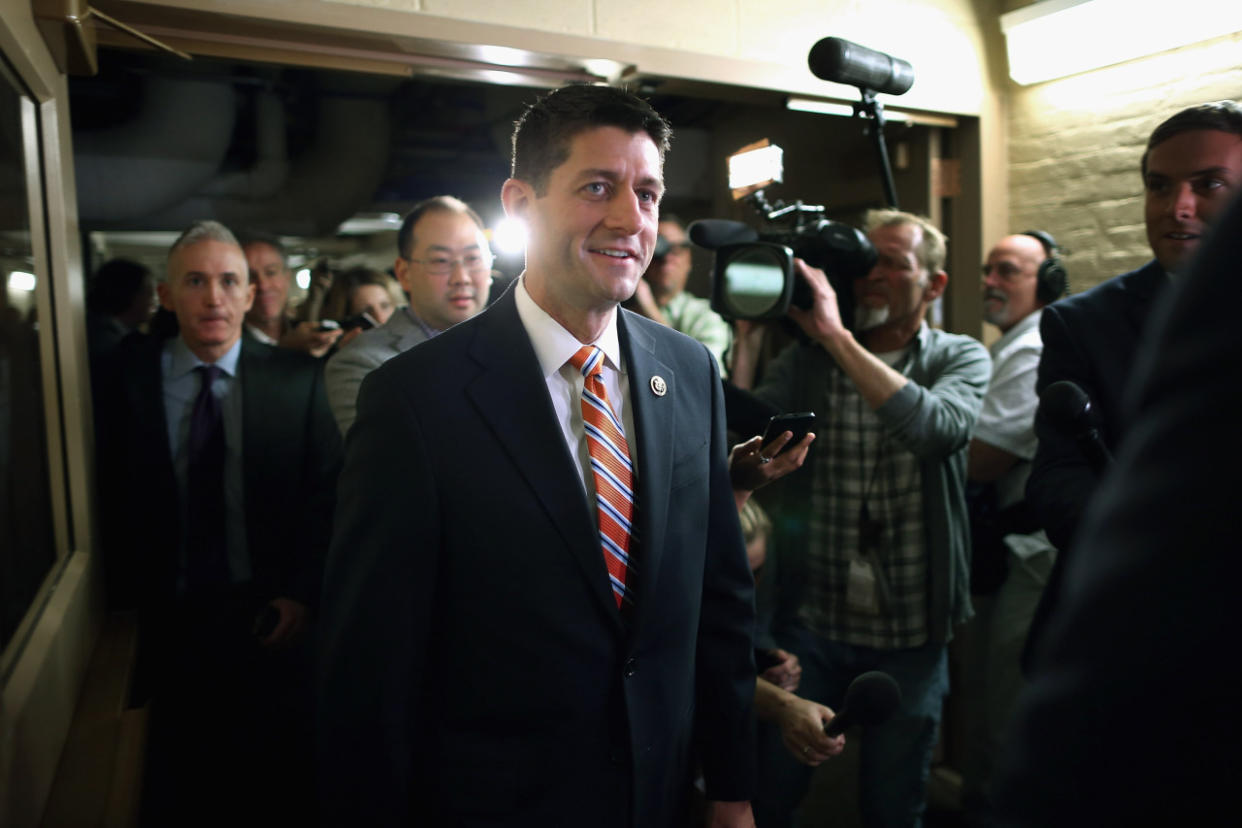Speaker or not, Paul Ryan’s career might never be the same

Rep. Paul Ryan in the eye of the media storm. Regardless of his decision on the speakership, this moment could shape the rest of his political life. (Photo: Chip Somodevilla/Getty Images)
Wisconsin Republican Paul Ryan does not want to be speaker of the House, for reasons that are as numerous as they are well-documented. But as he considers whether to accede to the overwhelming calls of his colleagues to seek the post, his most significant consideration could be the unintended long-term political consequences of ignoring establishment Republicans’ entreaties at a time they believe they need him most.
The reasons not to reach for the speaker’s gavel are obvious: The job is arduous, thankless, and, at this juncture, practically impossible, with Speaker John Boehner, R-Ohio, resigning and Majority Leader Kevin McCarthy, R-Calif., dropping out of the race to succeed him. The hard-right faction of the party, a group of 40 to 50 members, will never believe any person connected to the GOP establishment — a category that includes Ryan, the 2012 Republican vice presidential nominee — will be conservative enough.
Ryan, who presumably wants to run for president someday, would almost certainly be hurting his chances, perhaps irreversibly, by becoming speaker at such a difficult time. On the personal front, he has said he doesn’t want a job that would require him to spend most of his time, including weekends, away from his young children.
But here’s the Catch-22 for the ambitious 45-year-old politician: If Ryan turns down the speakership because he has presidential ambitions, spurning his Republican allies at their most desperate time could potentially alienate him from them indefinitely. In other words, Ryan is at a crossroads, and both pathways seem to lead away from the White House. Take the gavel, compile a record as speaker that makes you unelectable as president. Or refuse the gavel and be caught in a no-man’s land where you’ve ceded much of your establishment clout and put yourself at odds with a wide range of colleagues who literally and very publicly begged you to run.
All of that leaves the question of what a non-Speaker Ryan does if he leaves his party hanging by turning down a leadership bid: What role does he fill? Can he still aggressively raise money for himself or the party?
The answers to these questions are murky at best. Most of Ryan’s significant contributions to Congress in his tenure have been policy-oriented. And his role since coming back to the House after the national-ticket loss in 2012 has been one of a behind-the-scenes, pragmatic dealmaker. His pro-immigration-reform stance and the budget deal he struck in 2013 with Democratic Senator Patty Murray of Washington, defusing the government shutdown bomb in the hands of conservatives, did not win him many Tea Party friends.
As Ways and Means Committee chairman, a long-coveted job, Ryan has eyed the first major overhaul of the nation’s tax code since the 1980s. But he certainly would need establishment — not to mention Democratic — support to move forward with any major legislation.
Ryan’s spokesperson has said not to expect an announcement from the most-watched man in politics this week while the congressman is home in Wisconsin for recess.
But at a time in politics where decisions and news cycles move quickly, Ryan’s very open hesitation is telling. A savvy politician, he probably knows he’s in a lose-lose situation relative to the original plans he had for his own career. For Ryan, there’s no such thing anymore as staying the course, and all he can do is decide whether he has more to gain by making a dramatic reversal than he does to lose by resisting the difficult and pressing new reality that Boehner’s resignation has created.

